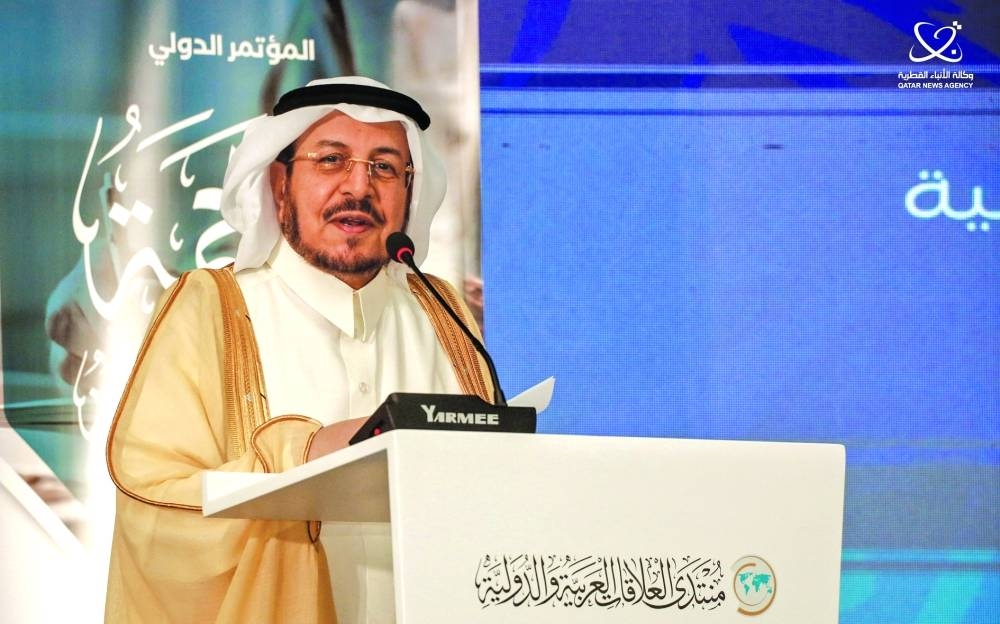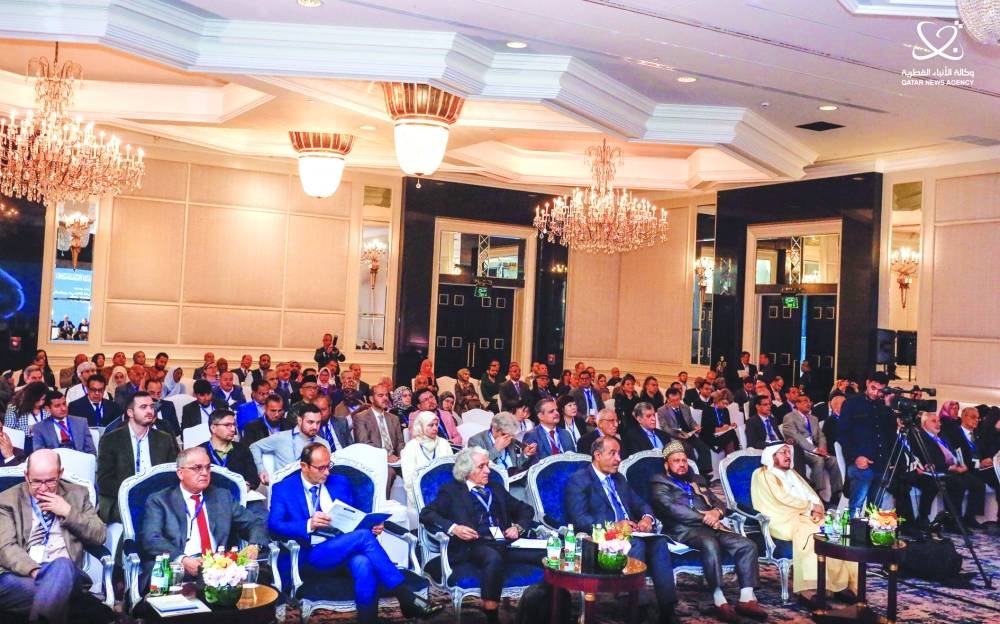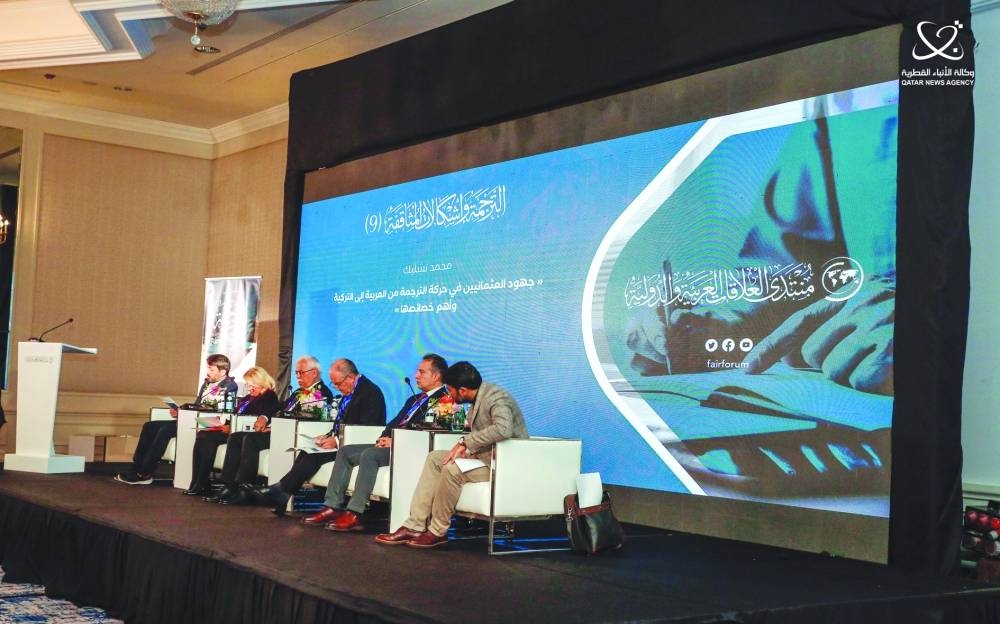The 9th International Conference on Translation and Problems of Interculturalisation kicked off in Doha Saturday, organised by the Forum for Arab and International Relations, after having been held virtually in the previous two years due to the Covid-19 pandemic.
The Director of the Forum for Arab and International Relations Dr Mohamed Hamed al-Ahmari in the opening speech introduced the conference and stating its objectives, noting Qatar's role in supporting translation and translators, through its Sheikh Hamad Award for Translation and International Understanding.
Director of the Forum for Arab and International Relations underlined the important role of intellectual-translators who convey global languages and cultures to the Arab and Islamic worlds, equally as they transfer Arab thought into world languages, noting that the Arab and Islamic worlds encompassed, protected and translated from foreign languages and cultures in the past, giving the world some great names in translation who transferred the works of Greek, Persian and Indian cultures, and whose works gained fame even in foreign cultures.
Al-Ahmari also valued the translators' efforts in transferring Arab and Islamic cultures to the rest of the world.
The conference's first session was dedicated to the topic of Arabic/Turkish translation.
The session started with a study conducted by Dr Mehmet Celik, translator, researcher, and member of the Faculty of Islamic Studies at the Fatih Sultan Mehmet University, Turkey, on the Ottoman translation movement from Arabic into Turkish and its most important characteristics.
On the other hand, Dr Aysel Ergul Keskin, head of the Department of Arabic-Turkish Translation at Istanbul Aydin University, overviewed the Arabic literary works translated into Turkish during the period 2013-2023.
The research of the translator, Dr Burhan Koroglu, dean of Faculty of Humanities and Social Sciences at Ibn Haldun University, Turkey, and professor of Islamic philosophy, shed light on the role of translation from Arabic in the framework of strengthening links with Islamic culture and thought in Turkey.
The session concluded with a study done by Saut Yusuf Akyuz, translator, Ottoman and Arab-Turkish relations history researcher, and lecturer at Ankara Yildirim Beyazit University, on the reality and challenges of the translation movement from Turkish into Arabic, and the role of Turkish institutions.
Several of the research papers were discussed in the second session of the conference, which revolved around the topic of self-translation.
The research paper on "Self-translation and identity" by the Director of Programmes in the Unesco Chair at the University of Kufa in Iraq, Dr.
Ahmed Basem Saadoun, indicated that self-translation may give identity a cultural diversity that makes it more open to the world.
Meanwhile, Chief Translator of Dar Al-Mamoun for Translation and Publishing at the Ministry of Culture in Iraq, Ishraq Abd al-Adel's paper touched on self-translation from and into Spanish.
It dealt with the topic of personal translation or self-translation, while shedding light on a number of experiences of some Iraqi translators who have translated their writings into Spanish. The paper of the Moroccan translator and academic Abd al-Salam Ben Abd al-Aali, explained that its not enough for self-translation to reconsider what is called the mother tongue, but rather it raises the question of distinguishing between the author and the translator, between creativity and translation, and between the source and target text.
Academic, translator and Italian language professor at the University of Upper Alsace in France, Moawiya Abdel Majeed, presented a research on self-translation in Italian culture, in which he talked about the history of self-translation in Italian culture, the reasons for self-translation, and the Arab contribution in the field of self-translation between Arabic and Italian.
The third session of the first day of the conference, in which several research papers were discussed, was about translation and digitization.
The first day of the conference concluded with a discussion of a number of research papers, the most important of which was that of Egyptian translator Dr Shukri Mujahid's research entitled "Muhammad Anani is a teacher and translator", and Arabic language professor at University of Siena in Italy and translator Aqil al-Marai's paper on Dante's Divine Comedy.
The activities of the conference will recommence tomorrow, Sunday, where two sessions will be held.
The first session is about the problems of translating philosophical concepts, and the second is about translating religious texts.
At the end of the conference, the closing ceremony of the 8th Sheikh Hamad Award for Translation and International Understanding will be held, and the award winners will be announced.

The launch of the work of the ninth international conference on translation and the problems of acculturation in Doha

The launch of the work of the ninth international conference on translation and the problems of acculturation in Doha

The launch of the work of the ninth international conference on translation and the problems of acculturation in Doha
